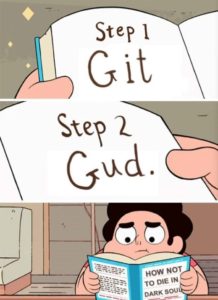Have you ever tried to go full competitive? Maybe got close at a couple RTT’s, but got paired with Sean Nayden first round, got touched in a bad place and lost all hope of leaving Scrubdom? ME TOO! Let’s start over from the bottom, and work our way up!
Hey guys, BigVik back with a series about getting good at games. This article series is being done in parallel with the Line of Sight Warmachine podcast and blog, if you’re interested, visit them here.
This series will be framed in 40k primarily, but is absolutely applicable to any game, or quite frankly anything, you want to get better at. This week we’ll discuss mindful practice!
Since 8th edition released I’ve started trying to play semi-competitively, started looking at tournament lists, and watching battle reports online. As a mon-Imperial Guard player I’d seen moderate success, placing top 10 in 2 GT’s and coming top 3 in most local events, but never a win. That’s where this writing kicks in!
This article series is my effort to force myself to improve my playing quality through showing all of my success and failures to you the reader. My true goal is to build an ongoing conversation with the readership which will engender continuous improvement among those who find my content at least somewhat interesting to read.
The competitive play field is something that many have looked at from a variety of perspectives and said anything from “That’s not so hard” to “Holy crap! How do you even do that!?”
This set of articles will be about the mentality needed to continually improve and will be game agnostic, my first subject
Mindful Practice
This is a notion which I see often among the highest tier players from games like chess, to Baseball, to Football, to what have you.
This is the idea that even if you play 15 games a week, you may not be gaining anything from those games played if you are not Mindfully Practicing. So, what is mindful practice?
Mindful practice is playing a game in such a way that when something goes right, or wrong, that you break down what the root causes of that event. The greatest hurdle to doing this in a dice game is the dice, many people look at the dice and say that was the root cause, but remember, if you needed a raw 8, you failed before you even rolled the dice.
Let’s look at an example:
I’m playing top table at a local tournament. It’s final round and I’m paired up against an ork player. I think I’ve got this, my guard list can kill ALL of the dudes. Well I was wrong. His list was built to give 5++/ 5+ feel no pain to all of his orks near his support characters, and my list didn’t have the capability to drill them out.
I start by figuring out what his biggest threat to me is. It’s a combination of his mek guns, Ghazghkull, and his storm boys. So that’s what I try to focus down. I kill as many of his guns as I can, and reduce both of his storm boy mobs down to below 10 models so he couldn’t mob them back up into each other. Sadly I just didn’t have the dice to focus out Ghazghkull, and he lived.
Ork builds being Ork builds, he got most of his army up in my face, but I was able to keep him off of my tanks by denying him landing zones for his psychic jumps, and forcing him to use his first Waaagh to clear guardsman bubble wrap. Using his positioning I was able to get an assassination run on Ghazghkull, which failed, and kill just about all of the boys in my face.
Sadly we only got to bottom of 3rd turn and time was called. I ended up losing by 1 point, due to many… many errors on my part. But let’s take a look at what mistakes I and my opponent made throughout the game.
- Time management was a thing. Though I had a clock going to ensure I didn’t get slow played, I played around a third of the round time, meaning my opponent had had twice the play time I had, ensuring that he could park on objectives and keep me from hosing him off of them
- I forgot that his mek guns counted as separate units for kill points, which he neglected as well and lost me 2 rounds worth of higher kill points, lesson? Know the mission rules, and read your opponent’s rules if you have a question.
- I just didn’t use my mortars effectively. There were always targets they could’ve been being used on, but I got too laser focused on something that had to die, my army was built to give me 2 to 3 turns of good quality shooting, I should have had more faith in my bubble wrap and kept the mortars shooting at grots, or boys out of buff range.
That is my input for the week. I’d like to hear from you guys, tell us what the situation was and what you learned!
Saying of the week- every player is playing by the same rules, and any player can be beaten.
And as always, Frontline Gaming sells gaming goodies at a discount, every day!
Frontline Gaming will buy your used models for cash or store credit!






Nice reference for those looking to play more competitively.
“Time management was a thing.”
Probably one of the harder things to do in a more competitive environment (local RT/GT) is figuring out what to do with an opponent who does not seem to be deliberately slow playing but who cannot play fast enough to get a reasonable game in. I still do not have a good answer for this. It is certainly more frustrating when it is something obvious like a horde player not using movement trays but it is certainly not only horde players causing this.
“Know the mission rules, and read your opponent’s rules if you have a question.”
Learning how important this can be in competitive play can be pretty rough. I am 9-1-1 this season in ITC (trying it for the first time). Almost every game has had an important swing as a result of keeping track of rules, even if it is draining. In order, as an example:
Game 1 (draw): Had to clarify re-rolls before modifiers and some other things which helped keep the game from getting out of hand.
Game 2 (win): Primary mission was kill points by power level. I thought my opponent’s tally was off so I re-calculated it with him and it went from a draw to a win.
Game 4 (win): Far closer than it should have been as my opponent was misusing stratagems (i.e. making Deathwing Assault into Endless Cacophony).
Game 5 (win): Opponent was not obeying 2″ coherency while trying to deny me Recon and had to be corrected on poxwalker placement rules. Fixing these helped a lot in shutting down the poxwalker engine and getting objective points. Opponent was also misplaying the rules for Advancing to attempt to get more re-rolls off of the Nurgle bell character.
Game 6 (win): Opponent struggled to play fast so only got a few turns in. I got several critical points when I corrected them on the range of Warptime (which I would only ever know from playing Chaos too in addition to my Guard), which stopped them from getting a kill and creating a 2-3 point swing.
Game 7 (win): Re-rolls before modifiers and some other similar things.
Game 8 (loss): Opponent was 60+ points over (caught at the end of the event, putting a sour note on the memory of an otherwise close and well fought game).
Game 10 (win): Re-rolls before modifiers (opponent thought they could Guide a Crimson Hunter Exarch to offset -1 to hit penalties).
So out of 11 games there are at least 8 I know of there were major rules issues and in at least 6 of them they were relevant to the game’s outcome and in a seventh very nearly were.
Hey man, thanks for commenting!
Yea I’ve found much of the complexity in 40k right now is the ITC mission packet (still a very good direction for the community), strategems (cause everyone has access to 2 or so factions worth unless they’re Xenos), and round time not being chess clocked (which seems to really be in the talks right now in my local meta)
I’ll be continuing this arcicle series in the near future, I hope to continue to hear from you!
There’s a bit of salt in this article… I need a beverage to wash it down.
I play against that Ork player often and have never had a poor game with him.
In the end, it sounds like you didn’t know the Ork rules and therefor had bad target prioritization and also didn’t understand how to defeat the Mek Guns. They’re frustrating to deal with, but there was no shenanigans.
There was also some issues with the fight phase in this game as well, if I recall correctly.
The lesson to learn here from knowing the whole story is, know thine enemy. and of course know the rules.
Well, I look forward to squaring off with you again Vick.